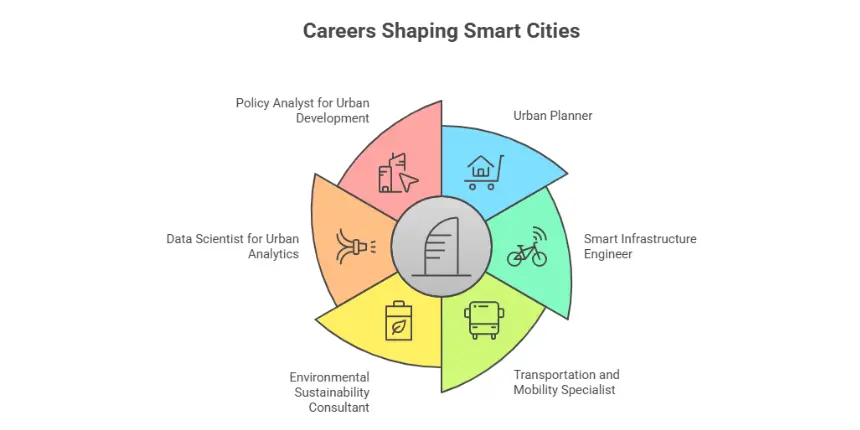Cities worldwide are embracing technology-driven solutions to tackle challenges like traffic congestion, pollution, housing shortages, and energy inefficiency. This shift towards intelligent urban development has created several top careers in smart cities and urban planning for professionals who want to shape the future of how we live, work, and interact in metropolitan areas.
The career landscape in smart cities and urban planning is particularly dynamic in India, where the government’s ambitious 100 Smart Cities Mission has accelerated demand for qualified professionals. Globally, similar initiatives in countries like Singapore, Denmark, and South Korea have established new benchmarks for what modern cities can achieve.
Whether you’re a recent graduate exploring career options or an experienced professional considering a transition, the field of smart cities and urban planning offers diverse pathways that combine technology, sustainability, and social impact. This comprehensive guide explores the most promising careers in this sector, the skills you’ll need to succeed, and what the future holds for urban development professionals.
Also Read: Photography as a Career
Top Careers in Smart Cities and Urban Planning
Explore some of the top job roles in the smart city and urban planning sector:
Urban Planner
Urban planners serve as the architects of city development, creating comprehensive strategies that balance growth with sustainability. Their role extends far beyond drawing city maps—they analyse demographic trends, assess environmental impact, and coordinate with various stakeholders to create liveable urban spaces.
Modern urban planners focus heavily on sustainable city layouts that incorporate green spaces, efficient transportation networks, and mixed-use developments. Environmental considerations have become central to their work, particularly in addressing climate change adaptation and pollution control.
Smart Infrastructure Engineer
Smart infrastructure engineers design and implement technologically advanced infrastructure that incorporates Internet of Things (IoT) devices, sensors, and automated systems into traditional civil engineering projects.
These professionals work on IoT-enabled buildings that can monitor energy consumption, manage lighting and temperature automatically, and provide real-time data on occupancy and usage patterns. Transportation infrastructure is another key area where they develop smart traffic systems, intelligent parking solutions, and connected vehicle infrastructure.
Transportation and Mobility Specialist
A transportation specialist is one of the careers in smart cities and urban planning that focuses on creating efficient, sustainable mobility solutions that reduce congestion and environmental impact. Their work encompasses everything from designing public transport systems to implementing smart traffic management technologies.
The rise of electric vehicles, expanded metro rail networks, and mobility-as-a-service applications has created new opportunities for specialists who understand both traditional transportation planning and emerging mobility technologies. They design integrated transport systems that connect different modes of travel seamlessly, from bicycles and buses to ride-sharing and autonomous vehicles.

Environmental Sustainability Consultant
An environmental sustainability consultant is one of the careers in smart cities and urban planning that ensures that smart city development aligns with ecological preservation and climate change mitigation goals. They work on diverse projects, including waste management systems, renewable energy integration, water conservation strategies, and green building certification.
The increasing focus on climate change and sustainability policies has created strong demand for these consultants across government agencies, private development companies, and international development organisations.
Data Scientist for Urban Analytics
Another one of the top careers in smart cities and urban planning is data scientists specialising in urban analytics. They use big data, geographic information systems (GIS), and artificial intelligence to solve complex city management challenges. They analyse vast datasets to identify patterns and insights that inform urban planning decisions and improve city services.
The role requires strong technical skills in data analysis software, statistical modelling, and programming languages like Python or R. Geographic information systems expertise is particularly valuable for spatial analysis and mapping applications.
Policy Analyst for Urban Development
Policy analysts focus on the regulatory and governance aspects of smart city development. They draft policies for inclusive housing, smart governance frameworks, and urban digitalisation strategies that ensure technology benefits all city residents.
These professionals work extensively on housing policy, ensuring that smart city development includes affordable housing options and doesn’t displace existing communities. Digital governance policies are another key area, covering data privacy, digital service delivery, and citizen engagement through technology platforms.
Skills Needed for Careers in Smart Cities and Urban Planning
Success in smart cities and urban planning careers requires a combination of technical expertise and soft skills that enable effective collaboration across disciplines.
Technical skills vary by specialisation but commonly include Geographic Information Systems (GIS) for spatial analysis and mapping, Internet of Things (IoT) understanding for connected city systems, data analytics capabilities for evidence-based decision making, and civil engineering principles for infrastructure development. Many roles also benefit from programming skills, particularly in Python, R, or SQL for data analysis.
Soft skills are equally important given the collaborative nature of urban development projects. Problem-solving abilities help professionals address complex challenges that often have multiple stakeholders and competing priorities. Strategic planning skills enable long-term thinking about urban development impacts. Interdisciplinary collaboration is essential since smart city projects typically involve professionals from engineering, planning, technology, policy, and community engagement backgrounds.
Professional development opportunities include postgraduate degrees in urban planning, public policy, or smart cities technology. Professional certifications from organisations like the Urban Land Institute, GIS certification programmes, and project management credentials can enhance career prospects. Short-term courses in emerging technologies like artificial intelligence, sustainability practices, or digital governance provide valuable skill updates.
Challenges in Smart Cities and Urban Planning Careers
Careers in smart cities and urban planning face several ongoing challenges that professionals must navigate effectively. Budget constraints frequently impact project timelines and scope, requiring professionals to work creatively within financial limitations. Policy delays can slow implementation of innovative solutions, particularly in government-led projects.
Rapid urbanisation creates pressure for quick solutions, but sustainable urban development requires careful planning and community engagement. Balancing speed with quality outcomes requires strong project management and stakeholder communication skills.
Additionally, the balance between technological adoption and inclusive growth remains a central challenge. Smart city solutions must benefit all residents, not just those with access to the latest technology. This requires professionals who understand both technical capabilities and social equity considerations.
Future of Careers in Smart Cities and Urban Planning
Artificial intelligence and machine learning integration will create new specialisation opportunities and change how urban analysis and planning are conducted. Predictive analytics for infrastructure maintenance, AI-powered traffic optimisation, and automated building systems will require professionals with both traditional planning skills and technology expertise.
Climate-resilient infrastructure is becoming increasingly important as cities prepare for extreme weather events and rising sea levels. Professionals specialising in sustainability and climate adaptation will find growing demand for their expertise.
Global collaboration in smart city development is expanding through international partnerships, knowledge-sharing programmes, and multinational development projects. These trends create opportunities for international career development and cross-cultural professional experience.
Blockchain technology applications in smart governance, digital identity management, and transparent public service delivery represent emerging career areas that will likely expand significantly over the next decade.
Also Read: Top Careers in Green Finance
Frequently Asked Questions
What are the most in-demand careers in smart cities and urban planning?
Urban planners, smart infrastructure engineers, and data scientists for urban analytics currently show the highest demand. Transportation specialists and environmental sustainability consultants also have strong job market prospects.
Which degree is best to pursue careers in smart cities and urban planning?
Urban planning, civil engineering, public policy, or geography degrees provide strong foundations. Many employers value interdisciplinary education that combines technical skills with policy understanding.
Are smart city careers limited to engineering and planning professionals?
Not at all. Smart cities require diverse expertise, including policy analysts, data scientists, environmental consultants, community engagement specialists, and technology managers. Social sciences and business backgrounds are increasingly valuable.
How is data science related to smart city development?
Data science enables evidence-based urban planning through traffic analysis, resource consumption monitoring, service delivery optimisation, and predictive modelling for infrastructure needs.




